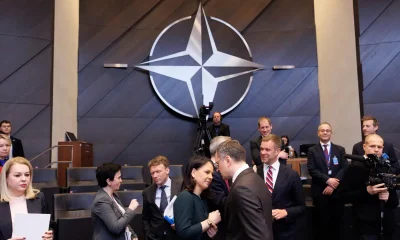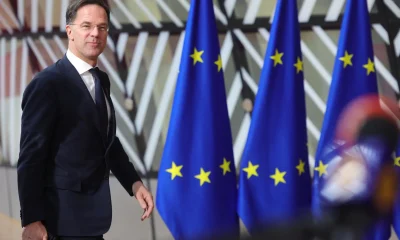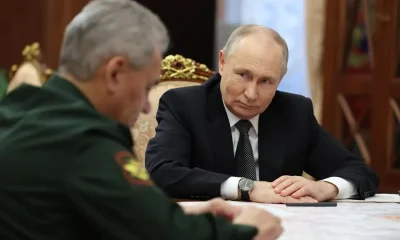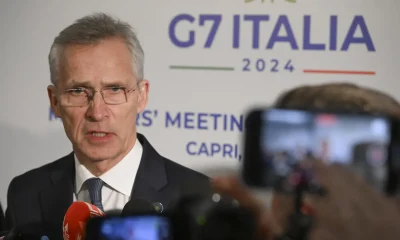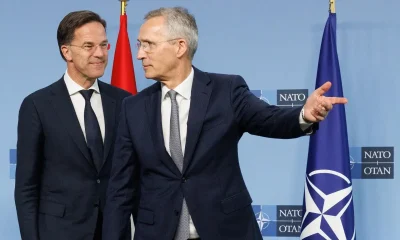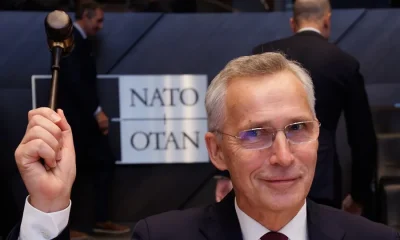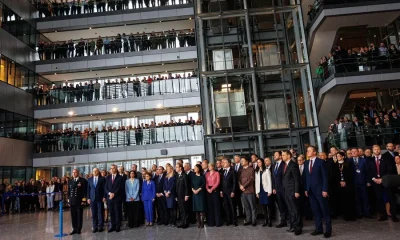International
The EU urges Georgia to withdraw the law on foreign agents that harms its rapprochement with the EU

The High Representative of the European Union for Foreign and Security Affairs, Josep Borrell, with the support of the European Commission, urged Georgia on Wednesday to withdraw its controversial law on foreign agents, considering that it harms its progress towards the EU.
After the approval of this law on Tuesday in the Georgian Parliament, the EU issued a statement by Borrell that could not be on behalf of the Twenty-seven due to the veto of Hungary and Slovakia, European sources told EFE.
Brussels issued a first statement signed by Borrell and the Commissioner for Neighbourhood and Enlargement, the Hungarian Olivér Várhelyi, and later published a second with the only rubric of the head of European diplomacy, supported by the whole of the college of commissioners.
European sources assured that the publication of the first text was due to an error.
“The approval of this law has a negative impact on Georgia’s progress on the EU path. The decision on the way forward is in the hands of Georgia,” the statement emphasized.
In that context, the Georgian authorities were urged “to withdraw the law, maintain their commitment to the EU path and move forward in the necessary detailed reforms.”
The statement also assured that the EU is willing to continue supporting Georgians who work for a European future.
“The EU is on the side of the Georgian people and their election in favor of democracy and the European future of Georgia,” the text stressed.
The statement states that “intimidation, threats and physical aggressions of civil society representatives, political leaders and journalists, as well as their families, are unacceptable” and calls on the Georgian authorities to investigate these “documented acts.”
He recalls that the European Council granted Georgia the status of candidate for accession, understanding that the country would adopt the nine relevant measures that the European Commission established last November.
These steps require that human rights be protected and that civil society and the media can operate freely, they added.
The measures also refer to the need for depolarization and the fight against disinformation.
However, and “despite the great protests and the unequivocal appeals of the international community,” the ruling majority of the Georgian Government has approved the law in Parliament, in third reading, the statement said.
“The EU has clearly and repeatedly declared that the spirit and content of the law do not conform to the fundamental rules and values of the EU.”
In his opinion, that legislation will undermine the work of civil society and the independent media, while freedom of association and freedom of expression are fundamental rights at the core of Georgia’s commitments as part of the association agreement with the EU and any way of joining the community club.
The Georgian Parliament approved the law on foreign agents on Tuesday despite the protests of the opposition and the West, which compare it to the Russian regulations that the Kremlin uses to silence the opposition, in a new twist of tensions in this Caucasian country.
The controversial legislation, promoted by the Georgian Dream government party and whose official name is “On the transparency of foreign influence,” was approved with 84 votes in favor and 30 votes against.
The president of Georgia, Salomé Zurabishvili, announced on Wednesday that she has created and will soon present a “European platform” to prevent the country from returning to the past.
“I have formed a European platform of common solutions that will mobilize Georgia for the parliamentary elections,” the president said at a press conference, alluding to the elections on October 26.
Zurabishvili made this announcement in a joint appearance with the heads of the diplomacies of Iceland, Latvia, Lithuania and Estonia, who arrived in Tbilisi today on a working visit as representatives of the European Union, who harshly criticized the “Russian law” approved the day before by Parliament.
“This platform will allow us to win the elections and finally put Georgia on the path of peace and stability,” said the president, who stressed her initiative to “save the country from returning to the past.”
Zurabishvili stressed that “between 80 and 85 percent of Georgian society supports the European future (of the country), as can be seen in the protests against the law ‘On the transparency of foreign influence’.”
“It’s about saving Georgia. The approval of this law is an attempt to return Georgia to the past. The authorities don’t listen to their people, they don’t listen to the advice of their Western partners,” he stressed.
The president confirmed that she will veto the regulation, which the opposition calls “Russian law” because of its similarity to that applied in Russia to persecute and silence the opposition.
NATO said on Wednesday that the approval in the Parliament of Georgia of the controversial law on foreign agents keeps the country away from integration into the European Union and the transatlantic area, and urged it to change course.
“The decision of the Georgian Government to approve legislation on the so-called ‘foreign agents’ is a step in the wrong direction and moves Georgia away from European and Euro-Atlantic integration,” said the spokeswoman of the Atlantic Alliance, Farah Dakhlallah through social network X.
In that context, the Allied spokeswoman urged Georgia to “change course and respect the right to peaceful protest.”
The Georgian Parliament approved the law on foreign agents on Tuesday despite the protests of the opposition and the West, which compare it to the Russian regulations that the Kremlin uses to silence the opposition, in a new twist of tensions in this Caucasian country.
The controversial legislation, promoted by the Georgian Dream government party and whose official name is “On the transparency of foreign influence,” was approved with 84 votes in favor and 30 votes against.
Georgia has aspirations to join the European Union and NATO.
In 2008, the leaders of the Alliance agreed at their summit in Bucharest that Georgia, like Ukraine, will be members of NATO when they are prepared for it.
International
U.S. Senate Rejects Budget, Bringing Government Closer to Shutdown Amid DHS Dispute

The U.S. Senate voted on Thursday against a budget proposal in a move aimed at pressuring changes at the Department of Homeland Security (DHS), following the killing of two civilians during a deployment of immigration agents in Minneapolis.
All Senate Democrats and seven Republican lawmakers voted against the bill, which requires 60 votes to advance, pushing the country closer to a partial government shutdown that would cut funding for several agencies, including the Pentagon and the Department of Health.
The rejection came as Senate leaders and the White House continue negotiations on a separate funding package for DHS that would allow reforms to the agency. Proposed measures include banning Immigration and Customs Enforcement (ICE) agents from wearing face coverings and requiring them to use body-worn cameras during operations.
The vote took place just hours after President Donald Trump said he was “close” to reaching an agreement with Democrats and did not believe the federal government would face another shutdown, following last year’s record stoppage.
“I don’t think the Democrats want a shutdown either, so we’ll work in a bipartisan way to avoid it. Hopefully, there will be no government shutdown. We’re working on that right now,” Trump said during a Cabinet meeting at the White House.
International
Trump Says Putin Agreed to One-Week Halt in Attacks on Ukraine Amid Extreme Cold

U.S. President Donald Trump said on Thursday that he secured a commitment from Russian President Vladimir Putinto halt attacks against Ukraine for one week, citing extreme weather conditions affecting the region.
“Because of the extreme cold (…) I personally asked Putin not to attack Kyiv or other cities and towns for a week. And he agreed. He was very pleasant,” Trump said during a Cabinet meeting broadcast by the White House.
Trump acknowledged that several advisers had questioned the decision to make the call.
“A lot of people told me not to waste the call because they wouldn’t agree. And he accepted. And we’re very happy they did, because they don’t need missiles hitting their towns and cities,” the president said.
According to Trump, Ukrainian authorities reacted with surprise to the announcement but welcomed the possibility of a temporary ceasefire.
“It’s extraordinarily cold, record cold (…) They say they’ve never experienced cold like this,” he added.
Ukrainian President Volodymyr Zelensky later commented on the announcement, expressing hope that the agreement would be honored.
International
Storm Kristin Kills Five in Portugal, Leaves Nearly 500,000 Without Power

Storm Kristin, which battered Portugal with heavy rain and strong winds early Wednesday, has left at least five people dead, while nearly half a million residents remained without electricity as of Thursday, according to updated figures from authorities.
The revised death toll was confirmed to AFP by a spokesperson for the National Emergency and Civil Protection Authority (ANPEC). On Wednesday, the agency had reported four fatalities.
Meanwhile, E-Redes, the country’s electricity distribution network operator, said that around 450,000 customers were still without power, particularly in central Portugal.
Emergency services responded to approximately 1,500 incidents between midnight and 8:00 a.m. local time on Wednesday, as the storm caused widespread disruptions.
The Portuguese government described Kristin as an “extreme weather event” that inflicted significant damage across several regions of the country. At the height of the storm, as many as 850,000 households and institutions lost electricity during the early hours of Wednesday.
Several municipalities ordered the closure of schools, many of which remained shut on Thursday due to ongoing adverse conditions.
Ricardo Costa, regional deputy commander of the Leiria Fire Brigade, said residents continue to seek assistance as rainfall persists.
“Even though the rain is not extremely intense, it is causing extensive damage to homes,” he noted.
In Figueira da Foz, a coastal city in central Portugal, strong winds toppled a giant Ferris wheel, underscoring the severity of the storm.
-

 Central America4 days ago
Central America4 days agoGuatemala seizes over a ton of cocaine hidden in flour at Pacific port
-

 International4 days ago
International4 days agoHistoric snowstorm paralyzes Toronto after 60 centimeters of snow
-

 Central America3 days ago
Central America3 days agoGuatemala Police Arrest Prison Guard Caught in the Act of Extortion
-

 Central America3 days ago
Central America3 days agoHonduras swears in conservative president Asfura after disputed election
-

 Central America3 days ago
Central America3 days agoBukele leads public trust rankings as UCA survey highlights gains in security
-

 International4 days ago
International4 days agoSpain’s irregular migrant population rises to 840,000, study finds
-

 International2 days ago
International2 days agoFootball Fan Killed in Clashes After Colombian League Match
-

 International3 days ago
International3 days agoWinter Storm Fern Leaves 30 Dead and Over One Million Without Power Across the U.S.
-

 Central America2 days ago
Central America2 days agoGuatemala President Says Starlink Terminal Found Inside Prison
-

 Sin categoría3 days ago
Sin categoría3 days agoEight Killed in Series of Armed Attacks in Ecuador’s Manabí Province
-

 International3 days ago
International3 days agoDoomsday clock moves to 85 seconds before midnight amid rising global risks
-

 International4 days ago
International4 days agoRights group says nearly 6,000 killed in Iran protest crackdown
-

 International2 days ago
International2 days agoRubio Says U.S. Could Participate in Follow-Up Russia-Ukraine Talks
-

 International2 days ago
International2 days agoMissing Spanish Sailor Rescued After 11 Days Adrift in Mediterranean
-

 International3 days ago
International3 days agoSpain approves plan to regularize up to 500,000 migrants in Historic Shift
-

 Sin categoría3 days ago
Sin categoría3 days agoEl Salvador Launches Fourth Year of Ocean Mission to Protect Marine Ecosystems
-

 International4 days ago
International4 days agoVenezuela frees at least 80 political prisoners, NGO says
-

 International4 days ago
International4 days agoEU launches new probe into X over AI-generated fake nude images
-

 International21 hours ago
International21 hours agoU.S. Senate Rejects Budget, Bringing Government Closer to Shutdown Amid DHS Dispute
-

 International4 days ago
International4 days agoSevere winter storm grips U.S., leaves multiple dead as extreme cold persists
-

 International4 days ago
International4 days agoFrance debates ban on social media for children under 15
-

 International21 hours ago
International21 hours agoStorm Kristin Kills Five in Portugal, Leaves Nearly 500,000 Without Power
-

 International21 hours ago
International21 hours agoTrump Says Putin Agreed to One-Week Halt in Attacks on Ukraine Amid Extreme Cold
-

 International21 hours ago
International21 hours agoMan Arrested After Vehicle Crashes Into Jewish Institution in Brooklyn

























